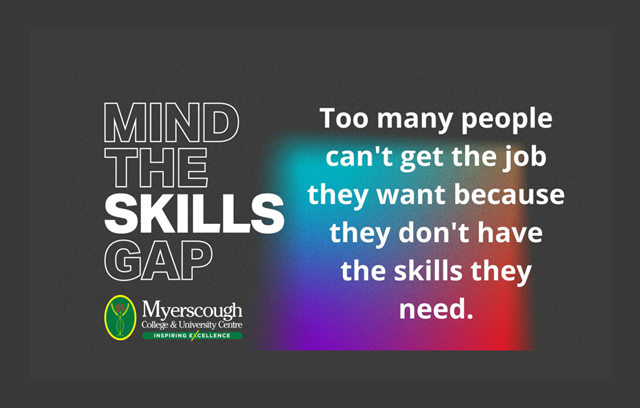Myerscough supports ‘Mind the Skills Gap’ campaign
- Published
- Wednesday 1 Mar 2023
Myerscough is supporting a campaign that aims to highlight to Government that without additional investment in further education and skills, colleges will be unable to fill skills shortages in key areas.

Too many people can't get the job they want because they don't have the skills they need.
College finances remain below what they were in 2010, according to economics think tank the Institute for Fiscal Studies[1]. Funding cuts mean spending per pupil in 2024-25 will still be around 5% below 2010-11 levels and for adult students it is 22% below 2009–10 levels.
With job vacancies at near record levels of over 1 million according to the Office for National Statistics[2], businesses are struggling to fill important posts which is reducing their ability to grow, which in turn hampers the health of the local and national economy.
Mind the Skills Gap aims to highlight the important role colleges and other further education providers play in giving people the skills they need to enter these often specialised jobs. Colleges could do even more with greater funding.

The scale of the skills shortages challenge we face
There are significant skills shortages across the economy as a result of rising health needs, the net zero transition and economic change. And meanwhile the supply of people with skills has been disrupted by post-Brexit immigration changes and the knock-on effect of the Covid pandemic.
A joint report from the Open University and British Chambers of Commerce (2022) identified the skills crisis already facing employers, finding that almost three-quarters (72%) of organisations say the impact of skills shortages is causing increased workload on other staff, while 78% are seeing reduced output, profitability, or growth.
The report found that more than two-thirds (68%) of SMEs are currently facing skills shortages, rising to 86% in large organisations, while 28% of businesses say they have had to turn down work or are not able to bid for work due to their staff shortage.
Colleges are the key to addressing these skills shortages
Local labour markets rely on the jobs which colleges help deliver year in year out, through training young and older people alike.
All the industries where skills shortages are being felt most acutely are serviced by level 4/5 skills and qualifications which are delivered in further education colleges.
But more investment in skills is needed
A growing economy needs ongoing investment in skills, for jobs today and to be agile as job needs change. Sadly, that investment is lacking in our country - post-16 education funding is way behind what is needed to boost economic growth. This is hampering growth.
Investing in skills gives instant and long-term returns through higher productivity, helping employers find and develop productive workers and in turn delivering higher wages.
Without additional investment in further education and skills, we will not be able to fill these skills shortages in key priority areas of the economy and deliver the labour market the country needs.
Colleges are ready to play their part
Colleges are ready to play their part in the Government’s plans to grow the economy, but they need the investment to be able to do that after 12-years of declining funding for adults and young people alike.

In order to address this, the Future Skills Coalition is calling for:
A right to lifelong learning free from restrictive constraints – that would help reverse the historic and damaging decline in the number of adults upskilling, retraining and filling vacancies in key skills shortage areas.
Fair, accessible and effective funding – to ensure colleges have the resources to recruit the staff needed to teach subjects in key skills shortage areas.
A national strategy to support local, inclusive growth – that would support colleges to meet skills shortages in their local economies.
The Future Skills Coalition is supported by sector organisations the Association of Colleges, the Association of Employment and Learning Providers and City & Guilds, has outlined three priorities to tackle this problem: A right to lifelong learning; fair, accessible and effective funding; and a national strategy to support local, inclusive growth.
